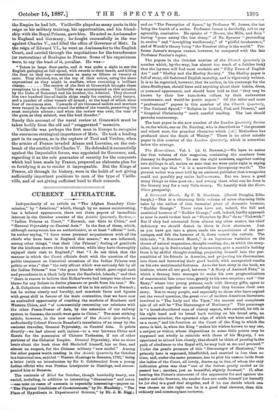A Borrowed Month. By F. R. Stockton. (David Douglas, Edim-
burgh.)—This is a charming little volume of some charming little tales by the author of that immortal piece of domestic humour, "Rudder Grange." These tales have not, indeed, the fall and unstinted humour of "Rudder Grange," and, indeed, hardly approach no near in merit to that book as "Sketches by Box" do to "Pickwick." But if they had emanated from almost any other source, the chief deficiency we should detect in them is their shortness. Just as you have got into a pied, made the acquaintance of the per- sonages, and felt the humour of it, down cusses the curtain. The title-tale, "A Borrowed Month," is an ingenious variation on the theme of animal magnetism, thought.reading, do., in which the story- teller, laid.np in Switzerland by rheumatism, gets a month's holiday from it by skilful thought-reading, projecting himself into the per. dualities of his friends in America, and projecting his rheumatism into them and borrowing their good health, with unexpected results on his own matrimonial fortunes. As to the beet story in the book, we hesitate, where all are good, between "A. Story of Assisted Fate," in which a dreamy hero manages to make his own prognostications of matrimonial fate come true, greatly to his own surprise; and "Our Story," where two young periled, each with literary gifts, agree to write a novel together so successfully that they become their own story. But to many people, and especially to those who have argued out the vexed question, the great crux of modern American literature, involved in "The Lady and the Tiger," the neatest and completed tale of all will be "The Discourager of Hesitancy." This personage is "a broad-shouldered man of cheery aspect, who carried, Its hilt in his right hand and its broad back resting on his broad arm, an enormons scimitar, the upturned edge of which was keen and bright as a razor," mid his function at the Court of the King in which the soene in laid, is, when the King "makes his wishes known to any one, a subject or visitor, whose dispositions in some little points may be supposed not wholly to coincide with three of his Majesty, I am appointed to attend him closely, that should he think of pausing in the path of obedience to the Royal will, he may look at me and proceed." Under the gentle pressure of this "Discoarager of Hesitancy," the princely hero is espoused, blindfolded, and married in less than no time, and, under the same pressure, has to pick his unseen bride from the-ladies of the Court, all lovely, drawn up in line, of whom the only indication given was that "one of the fairest gently smiled as he passed her ; another, juet as beautiful, slightly frowned." If, after hearing the Prince's statement of the arguments for and against the smiler and the frowner, the reader does not smile himself (or herself) he (or she) is a good deal stupider, and if he can decide which one was chosen as the right one he is a good deal oleverer, than this ordinary and commonplace reviewer.


































 Previous page
Previous page